#susan kay phantom
Text
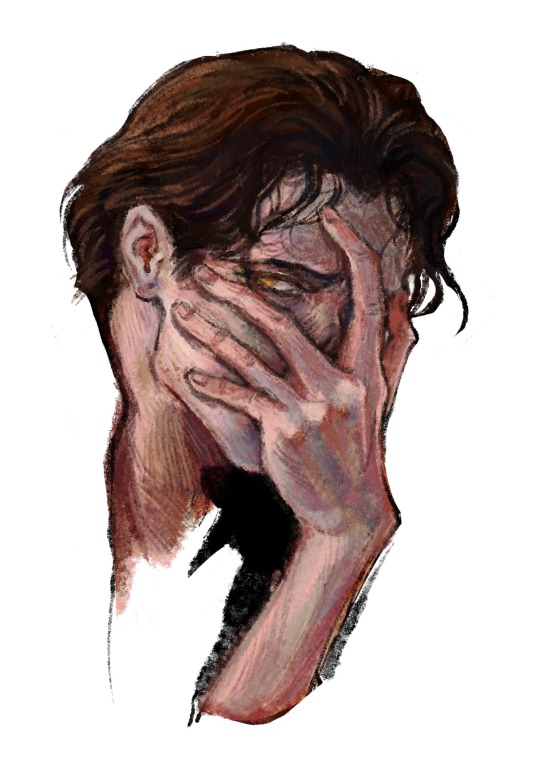
Hide your face so the world will never find you…
893 notes
·
View notes
Text
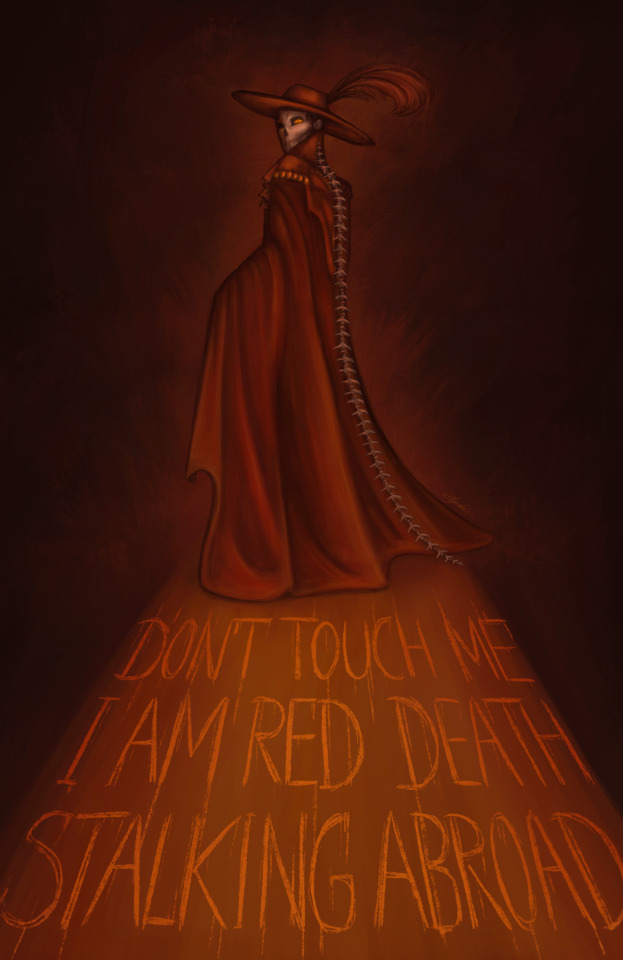
#phantom of the opera#poto#erik the phantom#leroux erik#digital art#artwork#character art#erik destler#susan kay phantom#red death#poto art#phanart#leroux phantom#gaston leroux
503 notes
·
View notes
Text

Kay Erik & Nadir - with a lil cameo by Ayesha.
#myart#phanart#susan kay phantom#the phantom of the opera#erik poto#nadir khan#daroga#erik the phantom#art#ayesha#sketchbook was filled recently so i'm going through things:D#ballpoint doodle#phantom of the opera#the persian
275 notes
·
View notes
Text
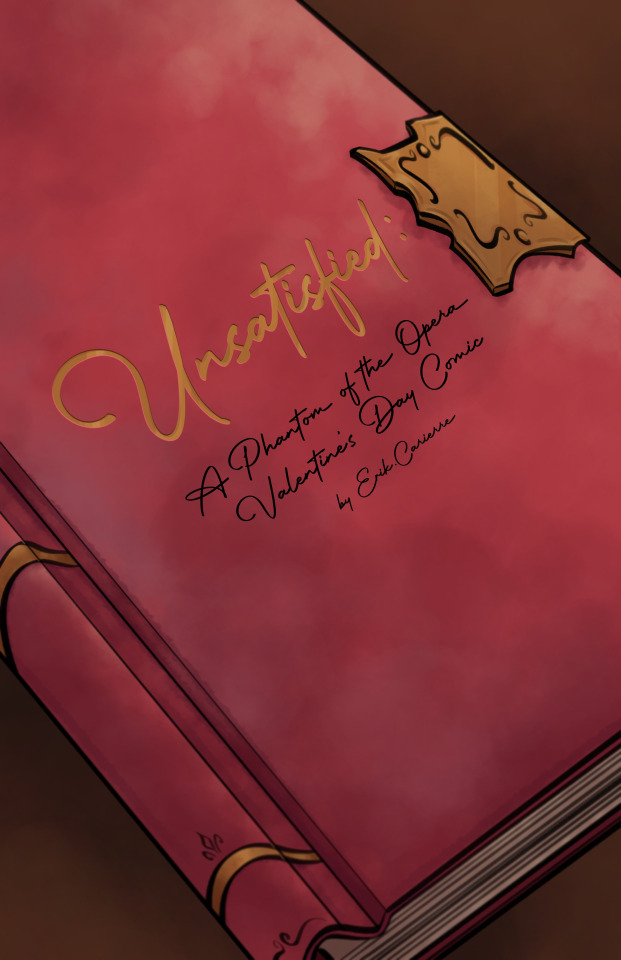
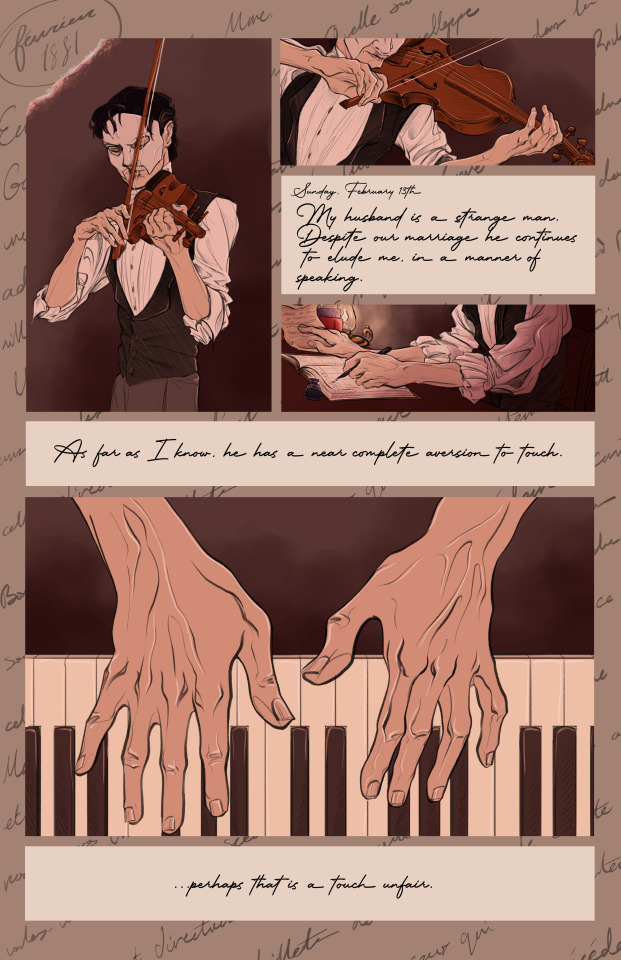
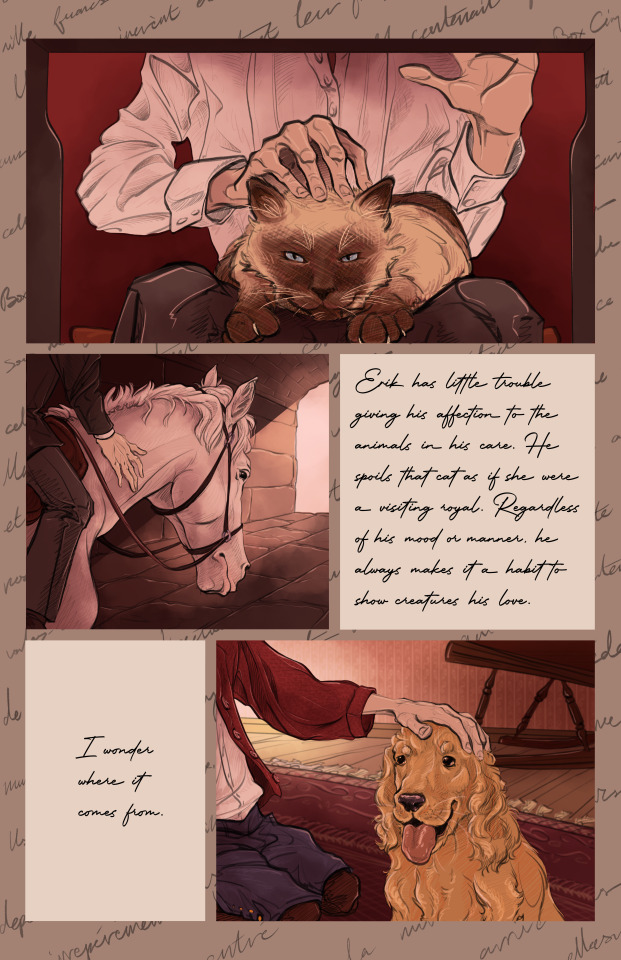
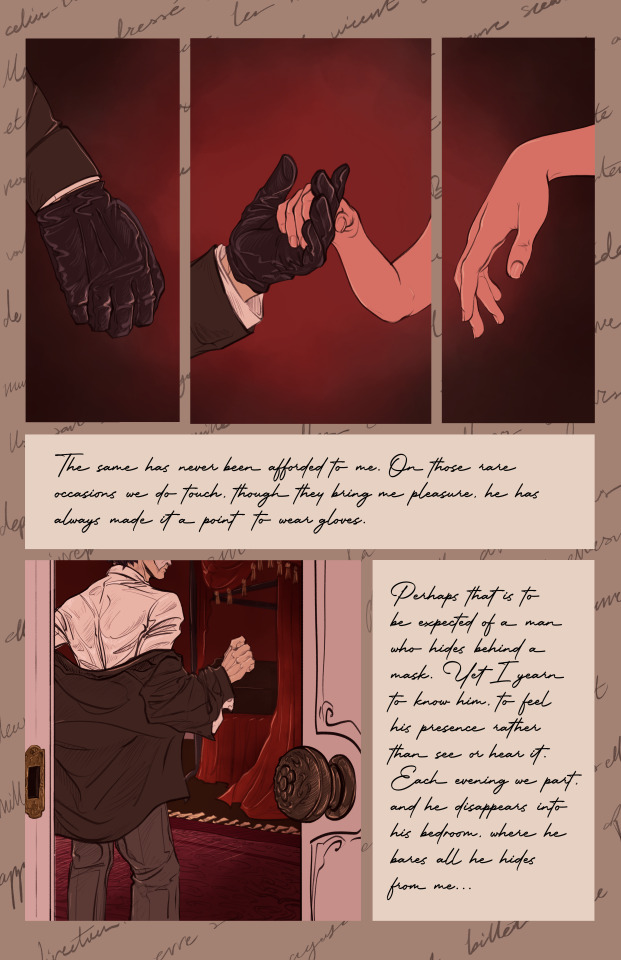


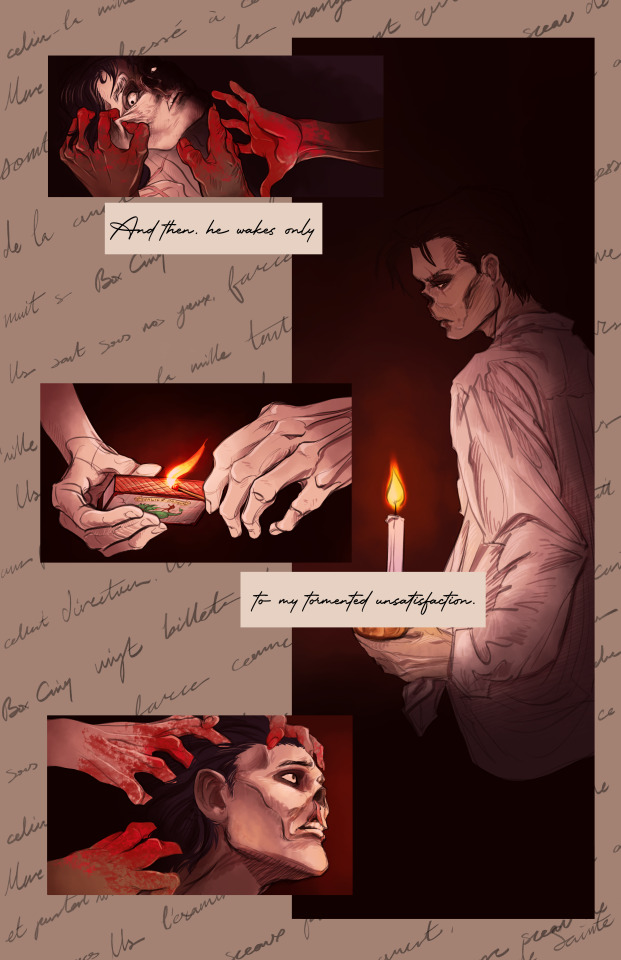

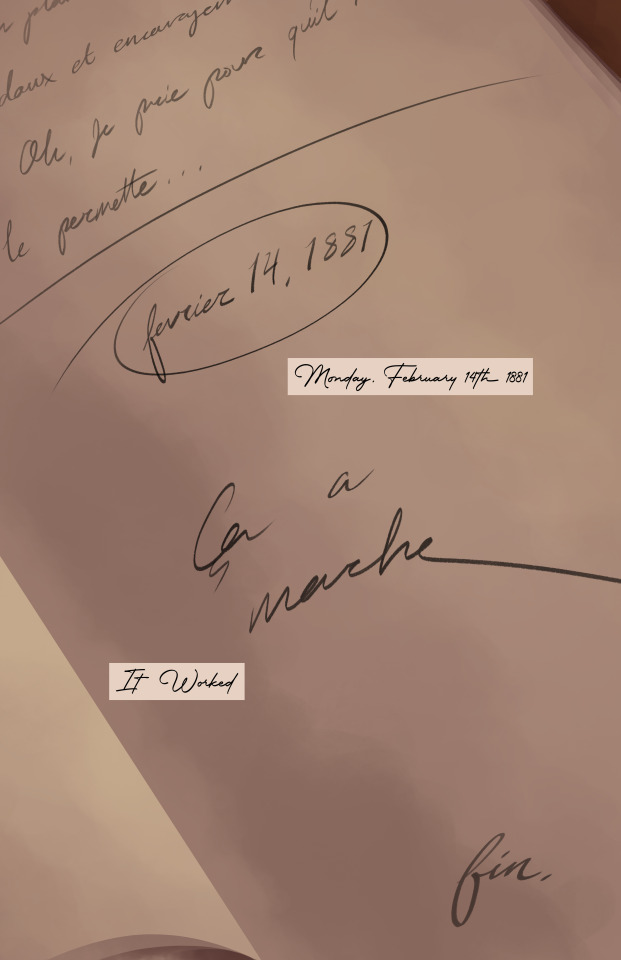

#poto#phantom of the opera#erik#poto fandom#phanart#phantom#christine daae#erik the phantom#the phantom of the opera#erik and christine#le fantome de l'opera#gaston leroux#susan kay phantom#comic#comic art#short comic
152 notes
·
View notes
Text
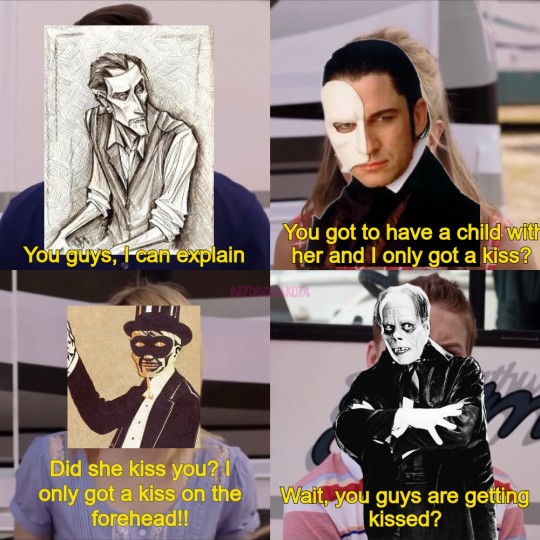
As the scared laws states, "When making a meme involving Susan Kay's Phantom, thou must use Muirin007's drawing ".
I didn't make the rules, I just follow them.
#muirin007#susan kay phantom#phantom of the opera#gaston leroux#erik destler#erik poto#kay!erik#the phantom of the opera#kerik#lerik#andrew lloyd webber
323 notes
·
View notes
Text


A little discussion after closing 🌃🥃
Closeups:
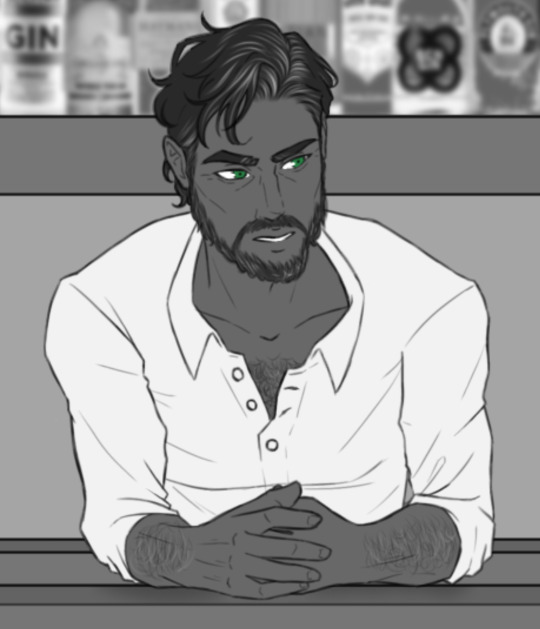
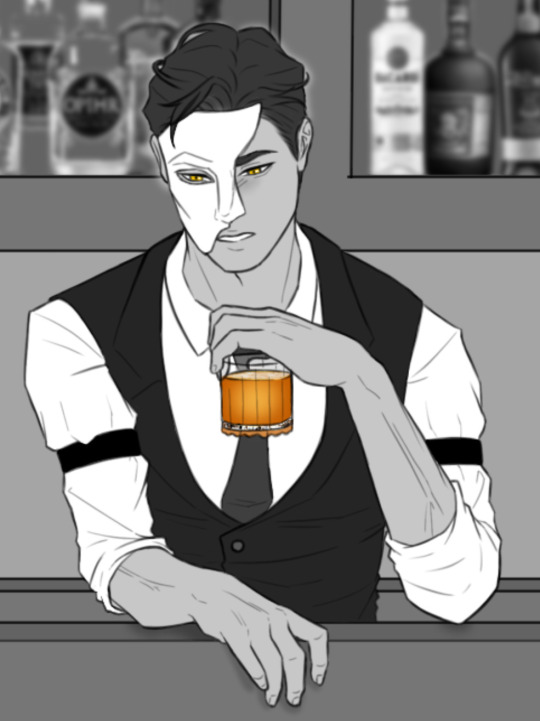
#phantom of the opera#digital art#erik phantom#erik poto#my art#phanart#phantom art#poto#poto art#the phantom of the opera#nadir khan#daroga#nadir and Erik#erik’s forearms#erik the phantom#Erik as a mixologist#bartender au#silver fox nadir#alw phantom#susan kay phantom#erik and nadir
117 notes
·
View notes
Text
The Magician’s Prelude
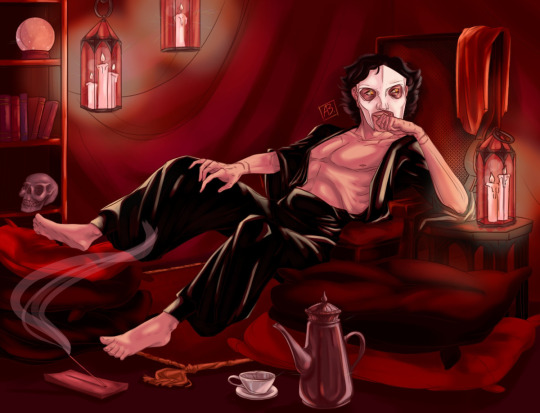
This is a gift for @erik-carierre posted with permission! Many thanks for your feedback and support!!
Summary: Erik’s morning routine while working as a magician in Russia prior to his recruitment by Nadir. Based on Kay!Erik.
Cover art and title by @erik-carierre
Content warnings: PTSD-like trauma flashbacks, bloody/gory imagery, slightly graphic descriptions of violence, body negativity (Erik is an angsty teenager)
Blood. There is always blood.
It oozes around the shards of mirror buried in the skin of my hands…it drips in thick crimson blobs onto the bundle of golden fur…it spatters in hot torrents against my chest and sticks to the open buttons of my shirt…
And it is there again that night. In the rooftop garden, I stand paralyzed staring at the gap in the crumbled balustrade. My chest feels hollow—I cannot breathe, I cannot scream—all I can do is watch as the gap yawns before me, pulling me closer. Against my will, I peer over the edge to view the sight I know is there.
I wish I could blink. I long for even the tiniest respite from what lay before me, but all I can do is look. Her body is small amidst the shattered rubble, her thin delicate limbs laying at odd angles, her soft barley hair matted with flecks of blood and gore. And her eyes…her pale eyes snuffed of all fire that had once bubbled inside of her like smoldering lava. They stare blankly up at my unmasked face, looking but not seeing.
All she ever wanted was to look at me…and now all I can do is look. Look at what I have done.
I awakened with a jolt, my eyes flying open and clenching the thin woolen blanket to my chest. One skeletal hand flew up to my face, and only once I felt the smooth hardness of the mask did I relax. After a moment of composure, I opened my aching jaw and heaved out a sigh of annoyance. The nightmares were as persistent as they had always been.
I sat up in bed and fumbled to light the oil lamp on the nightstand. I had no difficulty getting prepared in complete darkness, but I simply preferred not to after a night of haunting visions. A small clock beside the lamp told me it was early in the morning—earlier than I typically rose, but I was already resigned to the fact that I wouldn’t be sleeping any more if I tried.
I flung the woolen blanket to the side and felt the floor creak beneath my bare feet. The inn’s modest wooden room was comfortable enough for my needs: a bed with sheets, a chamber pot, a pitcher and washbasin, and most valuable of all, privacy. There had been a mirror, but I removed it soon after arriving.
I yanked off my nightshirt, letting the room’s warm air graze the scars slashed across my back. Russia had intriguingly hot summers; the books I had read as a boy only bothered to describe the harshness of the winter months, so I confess to being slightly bemused upon my arrival three years ago to a city with a climate only moderately cooler than the one I had left behind in Italy.
Her twisted body flashed before me again, the broken masonry wet and crimson from the split in her skull… I closed my eyes and angrily shoved the image back into the shadows of my mind. No. No more thoughts of that place. I poured water from the pitcher into the washbasin and dunked in a bar of perfumed soap. Once it had worked up a lather, I soaked a clean cloth and derisively began to wash myself.
The dawn of my body’s maturity had proven to be a dismal affair. It took my bones the full extent of my nineteen years to finally cease their growing, leaving me wretchedly gaunt and pitifully covered in pasty yellow skin. I had the strength of a man twice my age and triple my weight, but my frame still refused to resemble anything but a corpse. In my frustration, I scrubbed harder at my own flesh, attempting to cleanse it of its rotten color. But it remained as it always had, pulled tight over my arms to display veins and tendons, with the only thickness found in the old silvery scars adorning my wrists and hands.
Once I had scoured myself raw, I slung the cloth over the rack of the washstand to dry and stared down into the bottom of the basin. Silence screamed in my ears and my stomach twisted with dread. I turned my head to glance at the door behind me; the lock was securely in place, but the familiar prickle of eyes stung my skin all the same.
With trembling fingers, I removed the mask. Warm air rolled across my bare skin like a caress, or what I imagined a caress to feel like. I set the white sculpted shard aside on the stand, and after a heavy sigh, I bent over the basin and scooped handfuls of water over my head, scrubbing the soap’s lather deep into my thick black waves of hair. Droplets ran down the edges of my face, as if even they were afraid to touch the horror that was there. But I forced them to touch it, rubbing the water into the cracks and distorted furrows of my skin, smearing it around the protruding bones and into my eyes’ sunken pits. I braced myself with a grimace before carefully wiping the dried mucus away from the edge of the hole that was my nose.
The torture ended when I finally buried my repulsiveness in a towel. I held the soft cloth against my face as my other hand reached for the mask, slipping it back into place with a relieved sigh. I squeezed my dark hair free of water, then picked up a comb and worked it through the curls until they attained sufficient softness. I laid the towel and comb to the side and stepped over to the tiny wardrobe, withdrawing one of many black satin shirts and slipping it on. After dressing myself, I left my room and slinked down the stairs as a soundless shadow.
The empty tavern on the first floor simmered with the savory scent of shchi. This early in the morning, the only other soul awake was the ancient innkeeper preparing the first meal of the day. I scattered a handful of kopecks onto the bar, letting the clattering sound echo into the kitchen. A minute later, the shawled woman doddered forward and set a steaming bowl of cabbage soup and a chunk of crusty bread before me. No words or glances were exchanged, no questions were asked, as was our routine.
I suspected she found me strange—indeed, I have yet to encounter a soul who didn’t—but she seemed to tolerate me well enough. After her defective coal stove found itself repaired the day following my arrival, I was able to convince her to let me use her inn’s far room as a flat for several months. Unlike my fellow tenants, I paid precisely on time, never returned drunk or belligerent, and there was no risk of women being snuck into my bed. After all, what woman would be desperate enough to lay with a corpse, regardless of the payment offered to her?
With this bitterness lingering in my head, I ate my meal quickly and slipped out into the morning’s haze. It was a rare day; the air was pleasantly cool and the clouds had chosen to don a color besides their usual dismal grey. I assured myself that no one was watching before I lifted my head to admire the way the branches of trees cast their dark silhouettes against the paling sky.
The western quarter of Nizhny Novgorod was largely deserted, making it easy to dart through the city’s shadows unseen in my black attire. Once the day hit its sweltering peak, the cobbled streets would resemble the Volga river with rushing currents of wealthy merchants and colorful travelers from Europe and India and Persia. By that time, I would be waiting for them in my magician’s tent, where they would be shown more wonders than their feeble minds could possibly comprehend.
I rounded a corner and walked along the silent boulevard, until the trees bordering the street gave way to a wrought-iron fence. Beyond the fence, majestically imposing against the northwest horizon, stood the blinding white structure of the Spassky Cathedral. Pink wisps of sunrise stretched across the sky and barely kissed the golden spire atop its great dark cupola.
As I so often did on clear mornings like this one, I felt compelled to stop and gaze up at the splendid piece of architecture. My eyes danced over its fine pillars and elegant façade, admiring the expert carving and delighting in the exquisite use of symmetry and proportion. I had snuck inside once in the dead of night to glimpse its interior—what beauty! It lacked the scale of greater cathedrals, but in golden grandeur it did not disappoint.
There was a time when I had imagined building such great works myself. Beneath the creaky bed back at the inn lay several journals filled with sketches of the spectacular monuments I saw when I closed my eyes. The pages overflowed with details of magnificent marble façades and great towering pavilions, gilded figures in copper and bronze, ornate mosaics with details that dazzled the imagination. My architectural creations would be shrines of worship, not to any one god but to all forces that stirred the spirit and awakened man’s deepest emotions—art, geometry, magic, and most of all music. Oh, how I missed music.
Often this fantasy crossed my mind, and with every day and every kopeck in my purse, it seemed less and less like a child’s dream. After all, I was still very much in my youth…perhaps that day was still to come.
Once I had admired all I could bear, I tucked my masked face back down between my narrow shoulders and trudged off through the neighborhood of shops and teahouses. A smattering of humans were beginning to converge on the street that I walked: small groups of traders bickering in foreign tongues and leading wooden carts filled with wares to sell. Like me, they trampled up the soggy road to the shadow of the large red and yellow stone building, beyond which lay a great courtyard overlooking the bank of the Oka. It was here in the summer months that the great Markaryev Fair was held, where tradesmen and entertainers alike earned their gold.
I proceeded underneath the building’s archway and entered the city’s courtyard. Vendors were already busy erecting tents and unloading their goods in designated sections around the square. Past cotton bales and crates of tea and spices, I spotted the oval shape of the familiar black yurt tucked in its corner, untouched as always. I never worried about the tent’s safety during my absence, for a rumor of a deadly curse had found its way amongst the traders that effectively warded off potential burglars.
As I walked, a warm breeze wafted through the market’s open air, carrying a strain of musical notes to my ears. My heart jumped and I whipped my head towards the sound. On the other side of the courtyard sauntered a muzhik fiddler, beard scraggly and legs stumbling as if drunk, the bow screeching as it was dragged across the rusty strings. A couple passing by threw a few coins into the hat that lay at his feet.
Under the mask, my lips pulled back in a snarl. How dare these fools reward such a tuneless, insolent mockery of music! That drunken bastard did not deserve the right to place his filthy hands on an instrument and spoil its sacred beauty for the whole city to hear. My bony form seethed beneath its black clothing, but I successfully fought back my fervid rage and stomped off towards the yurt. I clenched my shaking hands at my sides, imagining the feeling of the man’s throat beneath my fingers; a sharp snap from his neck and those dreadful notes would finally fall silent.
A crunch against the stones. The heavy tumble of rubble against the ground dampens the sound of her skull cracking open…
I entered the dark tent and pulled the fabric flaps closed behind me, blessedly muffling the horrid noises. A deep breath steadied my hands, and with practiced precision I navigated the small space and lit candles tucked in little red lanterns, banishing the darkness and revealing the blood-red of the yurt’s interior. Swooping red curtains hung from the concave ceiling; samples of shyrdak hangings formed the walls, weaving in swirls of black and gold into the otherwise scarlet room. I kicked off my shoes and felt the luxurious softness of the thick Persian rugs buried beneath velvet cushions.
I ignited the small charcoal stove to boil water in the samovar for tea. While it brewed, I reclined back against the cushions and turned my attention to the long wooden box tucked near the back of the tent: the trick casket. My fingers deftly pranced over the mechanism to open the box, and I withdrew the materials for my magician’s performance: decks of cards, stacks of silver coins, hand-carved trick dice. I arranged them all in neat rows upon the central rug with a small grin.
I struck another match and lit a few sticks of incense to flood the space with their heady, sweet fragrance. I had learned over time that it was beneficial for the minds of my audience to be stripped of their defenses—that way, they found my tricks more dazzling and dropped more rubles into my bony hand. Sometimes this state of enchantment would make them too bold, and bring out their insatiable nature that they otherwise hid from their gods during prayer in the temples and cathedrals. They became ravenous, foolishly curious; they would grope for my mask and demand to see what lay beneath…
All she wanted was to see me.
My hands curled upon themselves, extinguishing the match’s flame between my fingertips. The wretched visions played through my mind again and numbed the burn on my skin.
A mirror shard clenched between the tips of tweezers…bloody hands furiously digging at the grassy dirt…the heavy clunk of a knife’s hilt as the belt dropped to the floor… It was difficult to understand why I remembered certain details so clearly, while others merely faded into murky shadows.
Over the course of three years, the girl’s living face had become fuzzy in my memory. Indeed, I had only dared to look at her a handful of times while living with the master stonemason. Every time I did, my chest would fill with an uncomfortable constricting sensation, and I would be forced to look away or else stop breathing altogether. Her eyes had a heat that scorched all the way to my soul. She was fire—bold, passionate, all-consuming—and I knew better than to risk being burned. Or perhaps I was afraid.
But it was the moment I finally gave her what she pleaded for, the moment I ripped off the mask—her expression of pure horror, anguish and primal fear, grief for love she had never truly felt. That image would always remain in my memory perfectly in focus.
I slowly opened my hand, and I stared down at the two spots of black soot left upon the pale skin of my thumb and forefinger. Temporary scars, easily washed away. That’s all these dreams were to me…but still the pain they carried hurt more than the deep wounds left on my body.
With a harsh huff, I flicked the remnants of the match away and reached over to the samovar to pour myself a cup of tea. The earthy liquid seared down my throat and revived my senses, kicking the brooding memories away in favor of my present enterprise. Outside my tent, I heard the growing clamour of the fair coming to life—my audience awaited me.
A familiar pang prodded at my heart. Was this all? Would this pitiful life, shrouded away in a performer’s tent, forever be my purpose? In my heart, I longed to use my skills to create the majesty that filled my mind: grand palaces, ingenious machines, symphonies without equal. If I had to be confined to mindless magic tricks for greedy imbeciles, then they would be the best magic tricks ever conceived. In a way, I thought to myself scornfully, I had not left that traveling fair…perhaps I never would. But at least things were different now. I was my own master, and no one would ever cage me again.
As the incense swirled its sickly-sweet aroma through the air, I slipped further back into my tent and drew a sheer red curtain across my masked form. I laid back in my trick coffin and heard several soft clicks as the mechanism closed the lid and cloaked me in darkness—the one place I have ever truly belonged.
Long ago, I had accepted my place as prince of darkness, and I would reign over my realm with proud finesse. So let them in now, the merchants and peasants from all corners of the world. Let them think they are the kings and I am their fool. Let them believe they know what it is like to be afraid.
Let them in, and let them look.
#poto#phantom of the opera#susan kay phantom#my writing#fanfiction#poto fanfiction#erik poto#erik phantom
66 notes
·
View notes
Text

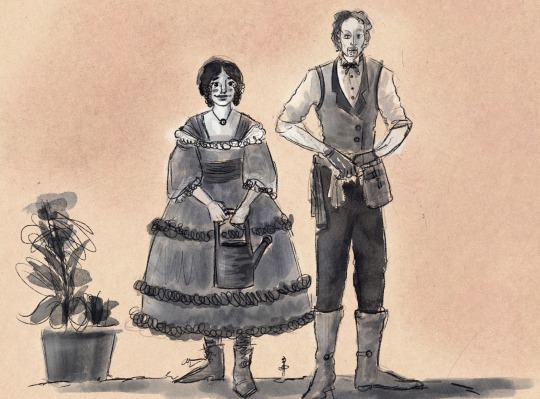
SO @box5intern and her ceaseless support of Luciana have had me feeling some doodling through some feelings lately.
#susan kay phantom#the phantom of the opera#doodles#erik#Luciana#Giovanni is the worst character in the whole book#justice for luciana#she’s just trying to live her teenage dream
70 notes
·
View notes
Text
Before ny ive read Susan Kay s book and in translation of this book on my native language Erik think about Ayesha as a _very smol lady_ so i decided to draw moment when he finds this little kitty on street and take her home

#doodle#traditional art#ink art#phantom of the opera#phantom#erik#erik poto#erik kay#the phantom of the opera#poto#susan kay phantom#susan kay#ayesha poto
215 notes
·
View notes
Text
Susan Kay's 'Phantom' Read: Part V (Erik, 1856-1881)
Before we start I feel that I need to talk about a perspective shift that I've had. More than half-way through the book now with the completion of this episode I've come to a realization.
Phantom is not what I thought it was. This epiphany has been slowly dawning but here we are.
My impression of Phantom, based on how I have seen it talked about in the Phandom (and certainly how the reviews on the back of the book present it) was that it was Leroux's story but with the blanks filled in and a few small liberties taken.
I had this impression because I was told that for quite a few years, Phantom was basically considered Canon and also because I have often seen Kayrik (or Kerik) and Lerik (or Leroux's Erik) conflated in discussions.
But as I'm reading I have finally realised that I don't think this is ever what Kay intended.
Don't get me wrong I hate most of the decisions she's made, but this book is a complete re-working of the source material with many elements of the book, some from the musical and some original folded in. For Erik's history she mainly follows the life-history detailed by Leroux, but in terms of Erik as a character, he more closely resembles Musical!Erik than anything (except that Kayrik's deformity affects his entire face, not just half). When we arrive at the Opera, she again adheres to Leroux's history. But once we catch up to the canon events, this time line is swiftly abandoned.
Nadir and Erik bump into each other and resume their friendship.
A few weeks later, Erik finds Joseph Buquet's body in his torture chamber.
A few weeks after that Erik hears the news of the Opera's change in management, and hears Christine sing for the first time.
In the source material, Buquet's body is discovered on the same night as Christine's initial triumph (so three months AFTER Erik began to teach her), the same night that the old managers, Debienne and Poligny, have their farewell celebrations and hand over management to Firmin Richard and Armand Moncharmin. Leroux describes Raoul rushing across the stage, "On which Christine Daae has just triumphed, and under which Joseph Buquet had just died." [This excluded from the original translation.
Why Kay chose to alter the progression of events I don't know, but that combined with a final nail in this coffin for me to realise that I had been approaching this book from entirely the wrong perspective. That final nail is the fact that Christine Daaé, in this book, is dark- haired and not blonde.
Kay does what most Phan-author's do: she cherrypicks her preferred elements from both book and musical (Erik general erudite comportment, his mis-matched eyes, Christine's dark hair) and combines them with her own headcanons to create an AU fic that, because of the reclusive nature of Fanfiction at the time and the fact that this work was published and widely circulated, became, for many fans not interested filling in the blanks themselves, erroneously synonymous with actual canon for a goodly number of years, despite its open contradictions to the source material.
Does that mean I like it any better? Haha fuck no. My irritation with Kay's choices persists. It's just that my ire for this book's influence is more accurately directed at the Phandom at large for making it something of a Golden Calf.
And like the Biblical Golden Calf I am here to pound it into dust and make everyone drink it.
So at this point I was going to complain that Kay never made mention of Erik being Christened "the trap-door lover" in Persia. There's even a CHAPTER of Leroux's novel called "The Masterstroke of the Trap-Door Lover". And this didn't come up even ONCE in Nadir's narrative. In fact the Persian and Leroux's narrator both talk about how Erik "rigged the palaces". Which is to say he made alterations to existing buildings and "turned the most honest construction in the world into a demonic house where one could not speak a word without being watched, or betrayed by an echo. How many family quarrels, how many bloody tragedies had the monster left in his wake with his trap doors?"
In Kay's narrative, Erik doesn't alter any existing palaces, he only constructs the Trick Box inspired palace described in Leroux's epilogue and his love of trap doors? Apparently it just isn't a thing.
Moving on
So of course we have to come back around to his mother. That was inevitable and I do actually appreciate it because we know Erik's furniture in the lair was his mother's.
The part where he views his mother's body is... eighhhhhh.
Erik describes the ravages of time in Madeleine's face and also the ravages of death. He talks about the irony that there's actually some resemblance between them now. And we get... this
And as I looked at her, I suddenly understood her revulsion at last--because now I shared it!
I felt no anger or grief as I looked down upon her . . . nothing except a disgust which enabled me to forgive any act of cruelty that she had ever shown me.
[...]
I did not kiss her, now that I had the opportunity.
I knew that she would not have wished it.
And I no longer felt any desire to do so.
I'm deeply confused as to what Kay is trying to convey here. Is Erik really saying that he doesn't want to kiss his mother because death has made her ugly? He goes on a lot about how death is gross and ugly and like... you just found out that your mom never re-married after you left. Never left the house she raised you in.
The misogyny REALLY steps up to the foreground here as well. He says of his mother's friend, Marie Perrault (the only person in this entire book with any rights imho)
This nervous, anxious, well-meaning lady had taught me to respect all members of the weaker sex.
Which, simply by calling them the "weaker sex"... you clearly don't? And after proclaiming is respect for ALL MEMBERS of the weaker sex, in the NEXT sentence he puts in a caveat about how he's never harmed an innocent woman, and also says something about the Khanom that really made me very, very queasy, and also reinforced my squicky suspicions about why Kay chose to make the cruel and capricious female figure in Persia an older woman (a domineering mother) rather than Leroux's "Little Sultana".
Very annoyed how Kay has graduated Erik's voice from "Automatic Aphrodisiac" to "Literally indistinguishable from Jedi Mind Tricks".
Erik regails us with how, using only his voice he is able to "reduce certain men to a trance-like state of obedience" (once exhibited on Nadir and his son Reza). When he meets Nadir again in Paris we are treated to this observation:
"Do you understand, Nadir? Keep away!"
His hand slid him it carriage door and he stood back with a trance-like obedience. He made no effort to prevent the brougham moving away, but although I knew my secret was safe for tonight, I felt no sense of complacency.
Once before he had broken free of my control, torn down the swaddling cocoon of sound with which I had bound him. Unlike Jules [Erik's lackey], he was not a natural subject; his will was too strong, his sense of identity and purpose too well developed.
Whenever he chose to fight my voice, I knew I would be unable to hold him.
That's a Jedi Mind trick. I'm sorry it is.
This section is actually quite enjoyable where the building of the opera house is concerned, but it takes a downturn, both in terms of the story and just the quality of the writing.
There are two instances of redundancy.
His death excited little excitement.
"My old interest in divination had never left me, and from time to time I still consulted the tarot cards in desultory fashion. It had been a long while since they had revealed anything significant, but now of late, each time I picked a card at random I seemed to turn up Death...
And this latter example leads me to something that really made me want to throw the book.
Since Nadir's narrative I have looked askance at something that has come up repeatedly: Susan Kay goes to GREAT LENGTHS to ensure that the readers know that Nadir I 100% straight. NO HOMO HERE, DEAR READER. ABSOLUTELY NOT. She shoehorns in a dead wife that Nadir never got over losing, and went into unnecessary detail about how when Nadir feels "the itch of manhood" (🤮🤮🤮🤮🤮) he avails himself of a prostitute or an odalisque. It comes up SEVERAL times. And when Nadir pops back up in Paris she makes sure to tell us that he has a mistress that he sees regularly. All of this to bring us to THIS infuriating line:
And so even as I walked with Nadir, talked with him, rejoiced in the warmth of communicating directly once more with a human soul, there was a part of me that looked at him with suspicion and wondered what part fate had assigned him in this new, unrehearsed opera.
Not the Lover, that was for certain. I'd seen enough girls leaving his apartments in Persia to be reassured that all of his instincts were purely heterosexual."
I'm not generally into gay readings of PotO. I don't ship Erik with either Raoul or with The Persian. But I will say that if there is an argument to be made for anyone in this book being anything less than 100% heterosexual, it's The Persian. Leroux makes no mention of him having a wife or anything of the sort. Tie that in with the determined responsibility and complex bond he seems to hold with Erik and a case can be made for our dear Daroga feeling something rather more than just sympathy for Erik. (I don't personally subscribe to this, but the case can certainly be made--I'm more of a DaRaoul girl tbh. I think that's an untapped gold mine).
But not here. Kay bends so far backwards as to have Erik say outright "Nadir is defo straight", while (even more bafflingly) implying that, perhaps, Erik is not. WHY, SUSAN. WHY?
Christine’s introduction is the single most "reads like Fanfiction (derogatory)" thing I've read in this book so far, but I find it very interesting how, when Christine sings for the first time Erik says that she "possesses a near perfect instrument". He says her technique is faultless, and that there's no weakness in either register. My first problem is that Leroux's Erik only ever calls Carlotta's voice an "instrument", because that's all it is to Carlotta. My second is that, according to Christine, her lower register was muffled and her upper register was shrill and her middle register wanted clarity. Maybe that's just Christine being too critical of herself, but I doubt that she had "flawless technique" when Erik began teaching her. Incredible latent talent for sure, but I do believe that she needed help with technique as well as motivation to reignite her passion.
Lastly we have Erik's description of when he first sings to Christine. His narrative regarding his motivation is actually very similar to my own:
She wanted an Angel of Music--an angel who would make her believe in herself at last.
[...] There was no reason in the world why I could not be the Angel of Music to Christine. I couldn't hope to be a man to her, I couldn't ever be a real, breathing, living man waking at her side and reaching out for her. . . .
But I could be her angel.
Is his motive here altruistic? No. But the sentiment is sweet enough. The notion of inspiring Christine's self-confidence is present.
Pity then that he takes a sharp left turn in the very next paragraph and utterly compromises any positivity in his intent.
I could not steal her body--but I could steal her voice and weld it irretrievably with mine; I could take it, and mold it, and make it mine forever...
Softly at first, infinitely softly I began to sing an old, heathen, Romany song. The Hollowed bricks carried the haunting melody relentlessly to her, permitted my voice to envelop her gently like a poisonous mist, seeping inexorably into her mind and staining her soul with darkness.
Well, well.
Once more unto the breach I go...
Masterpost
59 notes
·
View notes
Text
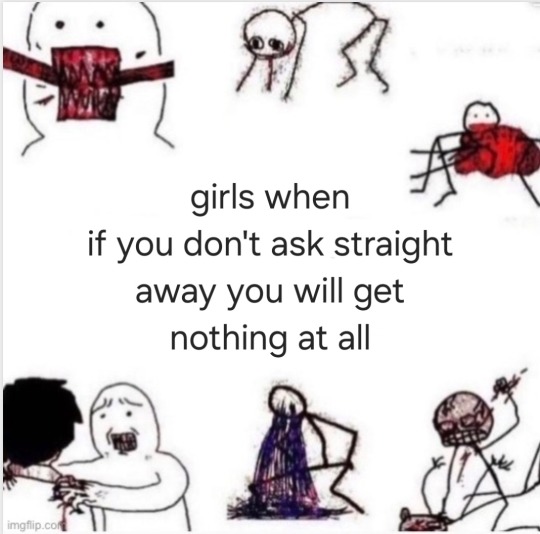
alert alert ive been reading susan kay again and it's got me mentally volatile !!
#the birthday scene motifs are so important to me#love mommy issues representation in media 😍#dont love the christine aspect of it all but beggars cant be choosers#erik#phantom of the opera#poto#erik the phantom#susan kay phantom#kerik
26 notes
·
View notes
Text
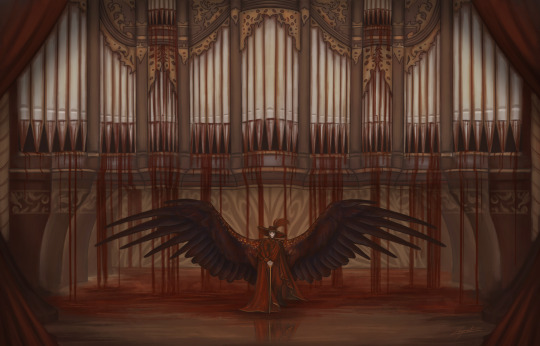
Red Death has come to take what is rightfully his own.
Version without wings under the cut:
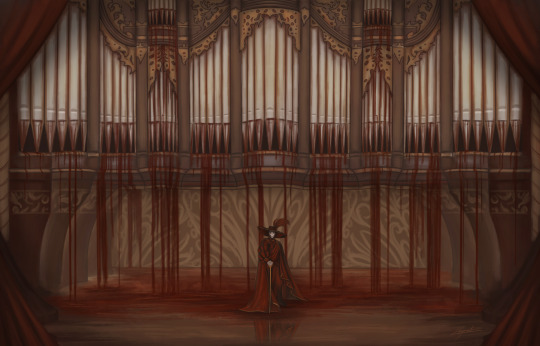
#gotta love some good old symbolism in art#in Susan Kay's book Erik also calls himself an Angel of Death#painting blood on things where it's obviously not supposed to be is my new favorite thing#for anyone wondering the organ design is based on the Bach-organ in Regensburg (Bavaria)#the Paris Opera sadly doesn't have such a glamorous one but that didn't stop me#it's artistic freedom baby#digital art#artwork#phantom of the opera#erik the phantom#poto#erik destler#gaston leroux#susan kay phantom#angel of music#phanart#leroux phantom#I spent so many hours on this holy shit
484 notes
·
View notes
Text

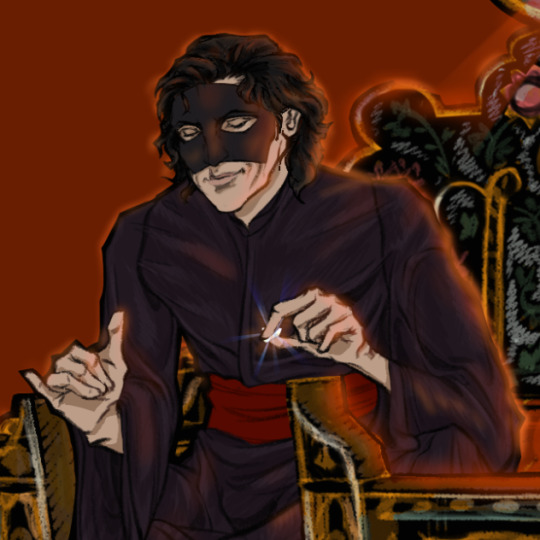
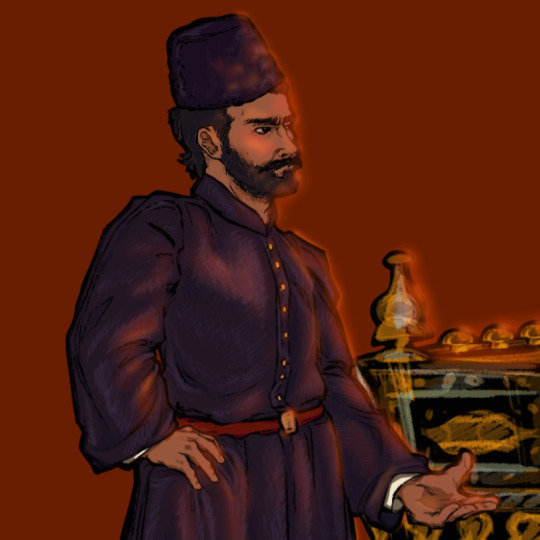


The not-quite-so Rosy Hours of Tehran
...in which Erik steals a diamond off the Peacock Throne. It's totally nbd.
#poto#phantom of the opera#erik#poto fandom#phanart#erik and nadir#phantom#susan kay phantom#erik the phantom#my art
124 notes
·
View notes
Text

#the phantom of the opera#phantom of the opera#susan kay phantom#gaston leroux#erik destler#erik poto#kerik#kay!erik
99 notes
·
View notes
Text
Based after the masquerade because we all know he cried or something on the roof like a drama queen
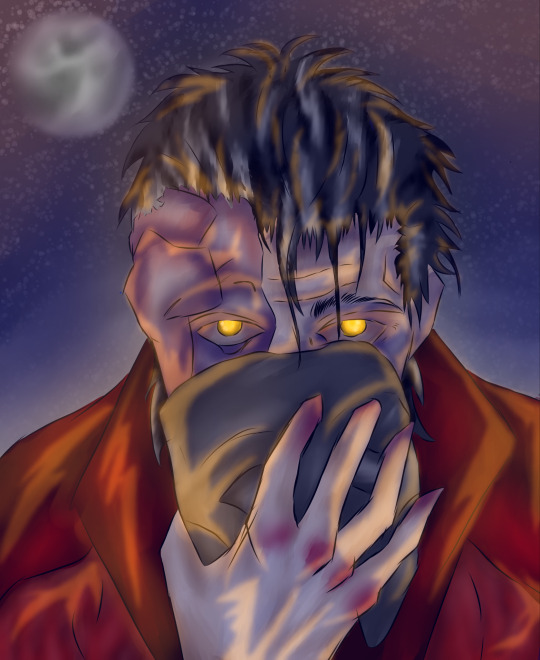
#drama skull man#susan kay phantom#lerouxposting#poto shitpost#phantom#andrew lloyd webber#phantom of the opera#erik destler
91 notes
·
View notes
Text
Erik: My own mother thought I was a monster
Erik: She was right of course, but it still hurt
#has this been done yet#source: atla#poto#phantom of the opera#poto erik#erik poto#susan kay phantom#incorrect quotes#poto incorrect quotes
88 notes
·
View notes